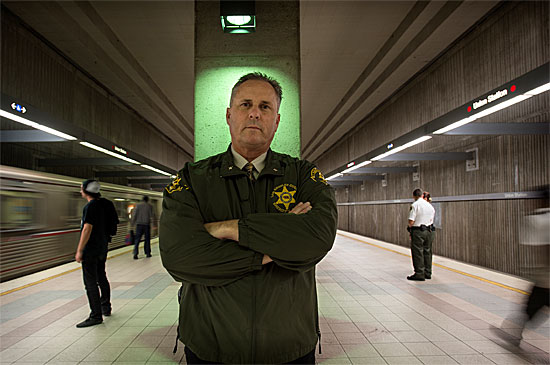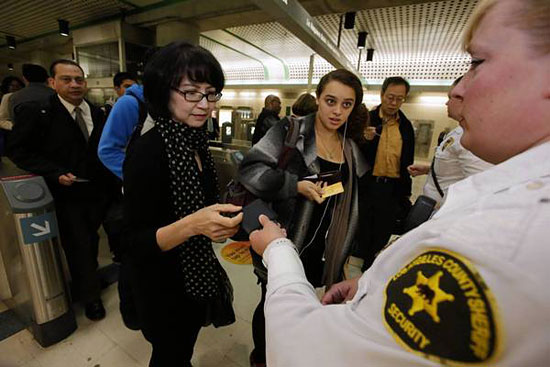Trial by fire for Metro’s new top cop
February 6, 2014

Commander Claus is a SWAT veteran with a dramatically different set of new responsibilities at Metro.
Sheriff’s Commander Michael Claus became the new head of security for Metro’s bus and rail system on January 6. He knew the job would be complicated, but he couldn’t have predicted what would happen next.
A week after he started, on the morning of January 13, a fatal stabbing took place on the Red Line. It was the second killing in the history of the line, and the widely-publicized tragedy forced Claus to throw out his playbook.
“If you can imagine taking a big, giant eraser board that has everything laid out nice and neat, and then just take both hands and move everything around? That’s what it was like,” Claus said.
Luckily, his police instincts kicked in.
“When something like this occurs, you have two issues,” Claus said. “One, you have to solve the problem, find out who did it and hopefully have an arrest—which we did. Second, as an administrator you have to look at what we did, whether we could have prevented it and what we can do now to prevent it in the future. You have to wear two hats.”
The first part comes naturally for Claus, 52, who has more than 33 years of experience as a Los Angeles County Sheriff’s Department deputy, SWAT team member and SWAT commander. The administrative part is new territory.
“I left my dream job,” Claus said. “When I was a deputy at SWAT, I always said I wanted to be the first person to work on the unit and then go back and command the unit. And I was the first person to do that. Eight months later I get a phone call and the sheriff asked me to come over here and command this bureau. You don’t tell the sheriff ‘no.’ ”
After decades on patrol, Claus now finds himself doing much of his work from behind a desk.
“This is completely different from anything I’m used to,” he said.
One immediate challenge has been managing public perceptions in the wake of the stabbing, which raised safety concerns among many transit riders. Claus said those fears are understandable, but they’re distorted by this isolated event, in part because of how the media covered it. “It’s like a plane crash,” he said. “After a plane crash they tell you it’s the safest transportation mode in the world. But when there’s a murder, the news doesn’t do that.”
According to Sheriff’s Department statistics, “Part 1” crimes, which include homicide, rape, aggravated assaults and theft crimes, are exceedingly rare on Metro’s system. On the Red Line, for example, there were only 3.8 of those crimes per million riders in 2013. Violent crimes are even rarer, with property offenses like the theft of electronic devices accounting for the majority of that number.
Other than a police station parking lot, Metro is one of the worst places to commit a crime. Perpetrators rarely get away because closed-circuit TV cameras are always watching and camera-equipped passengers serve as witnesses, Claus said. The suspect arrested and charged with the Red Line stabbing was identified using footage from train and station cameras.
“If Metro’s system were a city, it would be the safest city in the country,” said Duane Martin, who manages the agency’s work with the Sheriff’s Department. “People tend to focus on occurrences that are out of the ordinary. When something like this happens on Metro, it stands out.”
Still, even one crime is too many for the people charged with protecting the riding public. Claus is already brainstorming improvements. One idea he’s considering is assigning teams of deputies to the same couple of stations or bus stops every day to create a transit version of community policing, enabling the deputies to get familiar with regular patrons—and potential troublemakers. Currently, deputies are generally assigned to regions that they are familiar with and moved around as needs dictate. Claus wants to focus them on smaller beats to give them a proprietary interest in keeping each area safe.
Both Claus and Metro’s Martin are seeking to improve fare enforcement, a major priority for the agency. Currently, deputies are responsible for making sure that people pay their fares and for issuing citations to violators. But Claus believes that sworn deputies’ skills are better used elsewhere.
“From what I’ve seen so far, I think it’s a waste of a resource for a deputy sheriff to check TAP cards,” Claus said. “Deputy sheriffs should be performing law enforcement functions, not revenue functions.” He added that it’s tough to recruit good people because trained police don’t want to spend their days checking cards.
Claus envisions using Metro employees and security assistants to check fares instead, while deputies patrol for safety—a quick call away if a conflict arises. Martin agrees. “When they are on a train and they have both hands checking tickets, they aren’t looking for quality of life issues,” Martin said. With each sworn deputy costing the agency about $210,000 per year and civilian employees costing about a quarter of that amount, “you want to get the best bang for your buck.”
Claus also wants to improve how his team communicates with the public. “We are going to start educating people about how not to be victims,” he said. Part of that involves common sense steps like securing purses and electronic devices. However, in the case of a verbal or physical confrontation, he said, the best course of action is to be a good witness and stay out of the way. “It’s hard for me to say ‘don’t get involved’ because I’m one of those guys that would get involved,” Claus said. But, as a law enforcement officer, he pointed out, “I also carry a gun.”
Suspicious activity, of course, should be reported by dialing 911 or calling the Sheriff’s Department. But there’s a catch. That only works on buses and above-ground light rail; there is currently no cellular or wireless internet service on the subway. There, passengers should look for emergency phones at either end of each rail car and in the stations, or try to find a Sheriff’s deputy or a Metro employee. The agency is in the process of installing wireless service underground, but the effort will not be completed for about a year. “All we have is radio down there,” Martin said. “Having telephone service will be a godsend for us.”
The Sheriff’s Department acts as an independent contractor with Metro, which is paying the department about $83 million for the current fiscal year. The contract expires in June, and Martin expects that the next contract, which must be put through a competitive bidding process, will include new performance standards and different fare enforcement requirements. The current contract started in July, 2009, before TAP cards and gate latching were implemented. Back then, fare enforcement was done mainly by checking individual paper tickets.
Commander Claus hasn’t been on the job long, but he’s adapting quickly to his new position, which also involves delicate political situations he hasn’t faced before.
Because Metro’s territory cuts across many political boundaries, moving resources around can be touchy. “One of the lines may go through one county Supervisor’s district and one goes through another. They might ask ‘why are you taking resources from my district?’”
On top of that, there’s inherent friction between law enforcement’s duty to investigate crimes and Metro’s mission to reliably transport millions of people from place to place on time. Stopping rail lines for lengthy investigations can be a complex undertaking. “You have to find that happy medium,” Claus said.
It all adds up to a brave new world for a man who decided to become a police officer at age 5 while watching cop shows on television. Like any good administrator, his first task will be to take stock of what he already has.
“I love a challenge,” Claus said. “It’s like taking over a factory that makes cars. First you are going to learn how to make the car, and then you’re going to see if you can do anything better.”
Posted 2/6/14













 405 bridge work causes a stink
405 bridge work causes a stink

